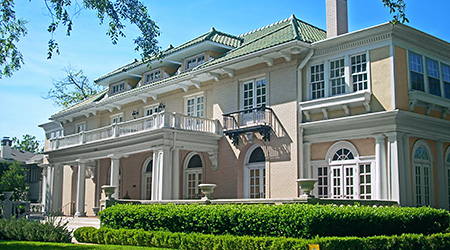What Is A Foreclosed Home?

Using real estate as an investment or purchasing a home for you and your family to live in has been one of the consistent reliable purchases that any person can make in the last 50 or more years. Fulfilling the dream of home ownership has been a lifelong goal for generations which signifies a certain level of maturity and responsibility. The ideal course of a person's life always seems to be graduate from college, get married, buy a house and start a family. Unfortunately, life has a way of disrupting even the best laid plans and losing a job or getting a divorce can often lead to personal bankruptcy and foreclosure. Losing ones home can be a significant blow financially and emotionally and it is not something to take lightly.
The Process
A foreclosed home is when the home owner encounters financial difficulties and is unable to continue making monthly mortgage payments. After a brief period of time, usually 30 to 60 days, the financial institution which owns or manages the mortgage will begin the process of foreclosing on the property. Foreclosing on a home is a legal process where the financial institution goes to court to file the appropriate paperwork and state its case before a judge. Depending on the organization managing the mortgage there may be additional tools or options available to work with a delinquent homeowner.
The Home Owner
When a home owner either by choice or by necessity stops making payments on a mortgage the home is likely to fall in to foreclosure. Sometimes, mortgage terms can be renegotiated to a lower the interest rate or the lender will offer a forbearance option to temporarily suspend mortgage payments. If these fail and the property is foreclosed then the homeowner has to vacate the premises due to an eviction notice. The foreclosure will also appear on the borrower's credit report for up to seven years. This will have significant negative consequences likely resulting in an inability to obtain other forms of credit including auto loans or another mortgage in the future.
The Mortgage Lender
A mortgage lender, normally a bank or credit union, who forecloses on a property will want to recoup their losses as quickly as possible. Initiating and executing a foreclosure is a complicated legal process requiring months of work and significant sums of money. A foreclosed home is likely to cost the lender tens of thousands of dollars in lost interest and repairs to resell the property. It is not unheard of for foreclosures to sell for up to 30% below market value at real estate auctions. The sooner a financial institution can get foreclosed properties off its books the less money it loses over the short and long-term.
The Investor
A foreclosed home can be a great investment opportunity for savvy real estate investors willing to assume certain risks. Foreclosed properties are often sold at real estate auctions sight unseen. They are also more complicated because additional leg work needs to be done by the investor to protect their financial interest. This often includes hiring their own home inspector and conducting a title search to verify there are no liens or unpaid property taxes. Unless an investor has years of experience in purchasing foreclosed properties they will also want to consult with a real estate agent. It is important to conduct extensive research to ensure you do not overpay on a foreclosed home.
Elsewhere on StockMonkeys.com







